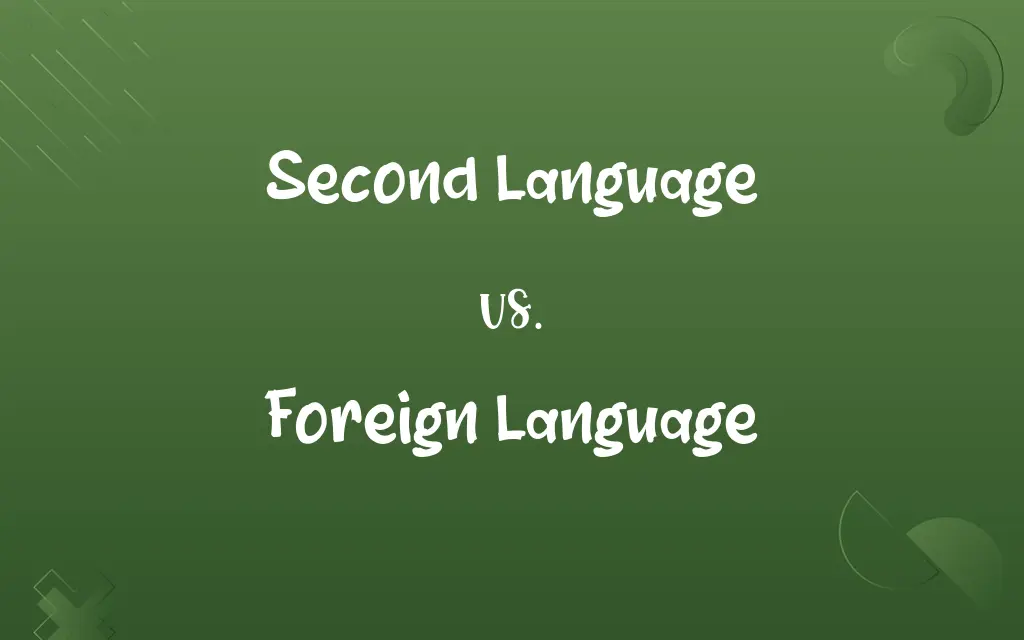Second Language vs. Foreign Language: Know the Difference

By Shumaila Saeed || Published on December 30, 2023
A second language is learned and used within an environment where it's spoken natively, while a foreign language is learned for use outside its native environment.

Key Differences
A second language is typically acquired in a setting where it is the dominant language, often for integration or communication within that community. For example, an immigrant in the United States might learn English as their second language to interact effectively in daily life. In contrast, a foreign language is studied and used outside of the areas where it is predominantly spoken. This could be a student in Japan learning French, where the language isn't widely spoken or required for daily interactions.
Shumaila Saeed
Dec 30, 2023
In the context of cultural immersion, learning a second language often involves direct interaction with native speakers and a deeper understanding of cultural nuances. For instance, someone learning Spanish in Spain is exposed to the language in various real-life contexts, from shopping to socializing. Conversely, a foreign language is frequently learned in an academic setting, focusing more on structured curriculum and theoretical knowledge. This might include learning Russian in a classroom in Canada, with limited exposure to native speakers or cultural experiences.
Shumaila Saeed
Dec 30, 2023
The motivation for learning a second language can be necessity or practicality, as it often plays a crucial role in everyday life and professional opportunities in a new country. Learning English as a second language in the UK, for instance, is essential for employment and social integration. On the other hand, learning a foreign language like Italian in India might be driven by personal interest, travel plans, or academic pursuits rather than immediate practical need.
Shumaila Saeed
Dec 30, 2023
The proficiency goals in learning a second language are often higher, aiming for near-native fluency to function effectively in society. For example, learning German as a second language in Germany would typically involve reaching a high level of fluency. In contrast, foreign language learners might aim for a basic to intermediate level, sufficient for travel, hobby, or academic purposes, such as an American learning Japanese for occasional travel.
Shumaila Saeed
Dec 30, 2023
Finally, the teaching methodologies differ significantly. Second language instruction often incorporates immersive techniques, real-life interactions, and context-based learning, like using French daily while living in France. Foreign language education, however, may rely more on textbooks, grammar exercises, and classroom-based learning, like studying Chinese in a U.S. high school.
Shumaila Saeed
Dec 30, 2023
ADVERTISEMENT
Comparison Chart
Learning Environment
Learned in a native-speaking environment.
Learned in a non-native environment.
Shumaila Saeed
Dec 30, 2023
Cultural Exposure
High exposure to native culture and practices.
Limited cultural exposure, often academic.
Shumaila Saeed
Dec 30, 2023
Purpose
Practical necessity, integration, employment.
Personal interest, travel, academic pursuits.
Shumaila Saeed
Dec 30, 2023
Proficiency Goal
Aims for near-native fluency.
Often basic to intermediate level is sufficient.
Shumaila Saeed
Dec 30, 2023
Teaching Method
Immersive, context-based, interaction with native speakers.
Structured, academic, focused on grammar and textbooks.
Shumaila Saeed
Dec 30, 2023
ADVERTISEMENT
Second Language and Foreign Language Definitions
Second Language
A language learned after the native language, often for practical use.
Learning Spanish as a second language helped her communicate in her new job in Mexico.
Shumaila Saeed
Dec 12, 2023
Foreign Language
A language learned for academic, personal interest, or travel purposes, not for immediate use in daily life.
Learning Japanese as a foreign language was his hobby, inspired by his love for anime.
Shumaila Saeed
Dec 12, 2023
Second Language
A language adopted in an immersive environment for effective integration.
She learned French as a second language while living in Paris, enhancing her cultural experience.
Shumaila Saeed
Dec 12, 2023
Foreign Language
A language studied primarily in a classroom or through formal education.
As a foreign language, her Spanish classes focused on grammar and vocabulary.
Shumaila Saeed
Dec 12, 2023
Second Language
A non-native language acquired for practical and social purposes in a native-speaking setting.
He improved his German as a second language to better understand local traditions in Berlin.
Shumaila Saeed
Dec 12, 2023
ADVERTISEMENT
Foreign Language
A language studied that is not commonly spoken in one's living or working environment.
She took French as a foreign language in school, fascinated by its elegance.
Shumaila Saeed
Dec 12, 2023
Second Language
A non-native language used in daily life and work in a country where it is commonly spoken.
His proficiency in English as a second language was crucial for his studies in the United States.
Shumaila Saeed
Dec 12, 2023
Foreign Language
A non-native language not essential for daily living in one's current location.
He learned Russian as a foreign language to read classic literature in its original form.
Shumaila Saeed
Dec 12, 2023
Second Language
A language learned due to living or working in a region where it is the primary language.
Moving to Italy necessitated learning Italian as a second language for daily interactions.
Shumaila Saeed
Dec 12, 2023
Foreign Language
A language learned for specific purposes like travel, culture, or interest, without the need for fluency.
She studied Italian as a foreign language for her upcoming trip to Rome.
Shumaila Saeed
Dec 12, 2023
Repeatedly Asked Queries
What is a Foreign Language?
A language learned that is not commonly spoken in the learner's immediate environment.
Shumaila Saeed
Dec 30, 2023
How is learning a Second Language different from learning a Foreign Language?
Second language learning often occurs in a native-speaking environment, while foreign language learning is typically in a non-native setting.
Shumaila Saeed
Dec 30, 2023
Why do people learn a Second Language?
For practical reasons like employment, education, and social integration in a new country.
Shumaila Saeed
Dec 30, 2023
Why do people learn a Foreign Language?
Often for personal interest, academic reasons, or travel.
Shumaila Saeed
Dec 30, 2023
What are the challenges of learning a Second Language?
Overcoming cultural barriers and achieving fluency for daily use.
Shumaila Saeed
Dec 30, 2023
Is it easier to learn a Foreign Language in a country where it's spoken?
Yes, immersion can significantly enhance language learning.
Shumaila Saeed
Dec 30, 2023
What is a Second Language?
A language learned in addition to one's native language, typically in a setting where it's widely used.
Shumaila Saeed
Dec 30, 2023
What are the challenges of learning a Foreign Language?
Limited exposure to native speakers and real-life usage.
Shumaila Saeed
Dec 30, 2023
Can a Second Language become as fluent as a native language?
Yes, with immersion and practice, it's possible to achieve near-native fluency.
Shumaila Saeed
Dec 30, 2023
Can learning a Second Language change the way you think?
Yes, it can influence thought patterns and cultural perspectives.
Shumaila Saeed
Dec 30, 2023
What's the best age to learn a Foreign Language?
Any age is suitable, though starting young can be beneficial.
Shumaila Saeed
Dec 30, 2023
How important is grammar in learning a Foreign Language?
Very important, especially in academic or formal learning contexts.
Shumaila Saeed
Dec 30, 2023
Can learning a Foreign Language help in understanding one's native language better?
Yes, it provides perspective on linguistic structures and vocabularies.
Shumaila Saeed
Dec 30, 2023
What's the best age to learn a Second Language?
There's no specific best age, but younger learners often find it easier to attain fluency.
Shumaila Saeed
Dec 30, 2023
Are there any cognitive benefits to learning a Foreign Language?
Yes, it improves memory, problem-solving skills, and cognitive flexibility.
Shumaila Saeed
Dec 30, 2023
Is it necessary to travel to learn a Foreign Language effectively?
Not necessary, but travel can provide valuable practical experience.
Shumaila Saeed
Dec 30, 2023
How does technology aid in learning a Second Language?
Through online resources, language apps, and virtual communication with native speakers.
Shumaila Saeed
Dec 30, 2023
How do cultural aspects influence Second Language learning?
They provide context and deepen understanding, making the language more relevant.
Shumaila Saeed
Dec 30, 2023
Does learning a Second Language improve job opportunities?
Yes, it can open doors to diverse career paths and global opportunities.
Shumaila Saeed
Dec 30, 2023
What role does motivation play in Foreign Language learning?
A significant role; high motivation often leads to better outcomes.
Shumaila Saeed
Dec 30, 2023
Share this page
Link for your blog / website
HTML
Link to share via messenger
About Author
Written by
Shumaila SaeedShumaila Saeed, an expert content creator with 6 years of experience, specializes in distilling complex topics into easily digestible comparisons, shining a light on the nuances that both inform and educate readers with clarity and accuracy.



































































